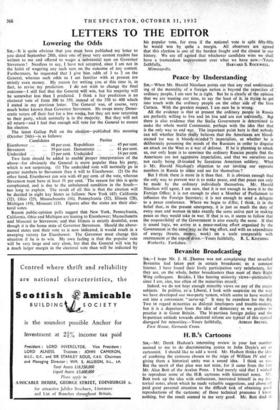LETTERS TO THE EDITOR
Lowering the Odds
Snt,—It is quite obvious that you must have published my letter to you dated September 28th, since one of your very earnest readers has written to me and offered to wager a substantial sum on Governor Stevenson ! Needless to say, I have not accepted, since I am not in the habit of wagering any such sum on the outcome of any contest. Furthermore, he requested that I give -him odds of 3 to 2 on the General, whereas such odds as I am familiar with at present are strictly even money. My reason for writing you at this time is, in fact, to revise my prediction. I do not wish to change the final outcome—I still feel that the General will win, but his majority will be somewhat less than I predicted. I think a fair prediction is an electoral vote of from 300 to 350, instead of the 350 to 400 which I stated in my previous letter. The General was, of course, very much better known than Governor Stevenson. He swept many Demo- cratic voters off their feet for a few weeks, but they are now returning to their party, which normally is in the majority. But they will not all return—and I feel that enough will vote for the General to ensure his election.
The latest Gallup Poll on the elegfion—published this morning (October 24th)—is as follows: Candidates Parties Eisenhower ... ... 48 per cent. Republican ... , 45 per cent.
Stevenson ... 39 per cent. Democratic ... ... 41 per cent. Undecided ... ... 13 per cent. Undecided ... ... 14 per cent. Two facts should be added to enable proper interpretation' of the above—for obviously the General is more popular than his party, which is not surprising. (1) The undecided vote will normally go in greater numbers to Stevenson than it will to Eisenhower. (2) On the other hand, Eisenhower can win with 49 per cent. of the vote, whereas Stevenson must have at least 51 per cent. The reason for this is quite complicated, and is due to the unbalanced condition in the South— too long to explain. The result of all this is that the election will be decided in eight key States as follows: New York (45), California (32), Ohio (25), Massachusetts (16), Pennsylvania (32), Illinois (28), Michigan (19), Missouri (13). Figures after the states are their elec- toral votes.
Recent public-opinion polls suggest that New York, Pennsylvania, California, Ohio and Michigan are leaning to Eisenhower; Massachusetts and Missouri to Stevenson; and that Illinois is strictly doubtful, even though it is the home state of Governor Stevenson. Should the above- named states cast their vote as is now indicated, it would result in a sweeping victory for Eisenhower. The Governor must change this situation if he is to win. My own feeling is that the popular vote will be very large and very closi, but that the General will win by a much larger margin in the electoral vote than will be indicated by
his popular vote, for even if the national vote is split fifty-fifty he would win by quite a margin. All observers are agreed that this election is one of the hardest fought and the closest in our history. We are all agreed-that whicheVer candidate wins we shall have a tremendous improvement over what we have now.—Yours


































 Previous page
Previous page